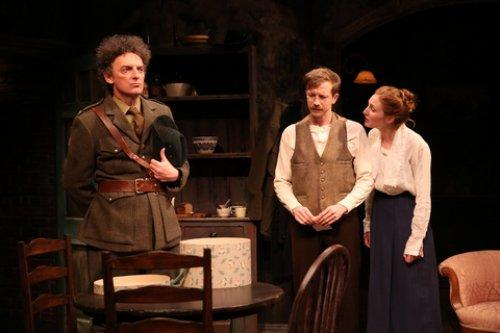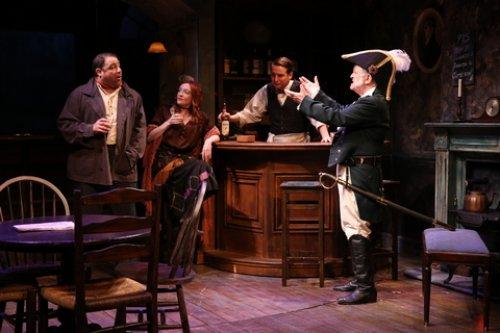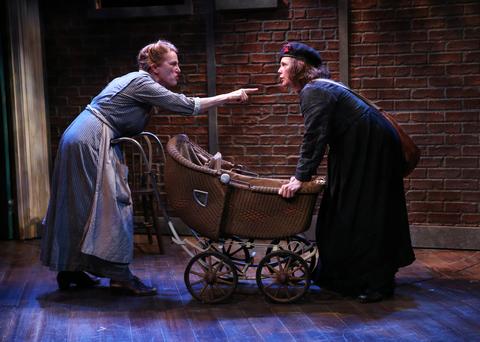The Plough and the Stars
The Irish Repertory Theatre concludes its wonderful Sean O'Casey season on a solid note.

John Keating, Adam Petherbridge and Clare O’Malley in a scene from the Irish Repertory Theatre’s production of Sean O’Casey’s The Plough and the Stars (Photo credit: Carol Rosegg)
The Irish Repertory Theatre ends its thirtieth season by going back to the beginning, with a sturdy revival of Sean O’Casey’s The Plough and the Stars. An historical prequel to the other two plays in O’Casey’s Dublin Trilogy, it was also the Irish Rep’s inaugural production, a daring choice that essentially served as an artistic mission statement, signalling a commitment not to shy away from Ireland’s ever-contested past.
In 1926, Irish Republicans started donning a commemorative badge in the shape of a calla lily to honor their comrades who died ten years earlier during the Easter Rising or, once it was put down, in front of British firing squads at Kilmainham Gaol. That same year, while memories were still clearly raw, O’Casey’s The Plough and the Stars premiered to a riotous reception at the Abbey Theatre, where it stripped away the mythic elements of the insurrection’s increasingly sacred status and depicted the Irish people as they really were, warts and all.
Like the creators of the Easter Lily, O’Casey sought to memorialize the dead, too, just not the honey-tongued Kilmainham martyrs or anyone they inspired through their flowery rhetoric to take up arms in the Dublin streets; no, O’Casey’s fallen were the ones who lost their lives despite never having chosen to rebel. If he had stopped there, the contrarian playwright might have avoided at least some of the more negative, performance-interrupting reactions to his work, which contributed to his long estrangement from both the Abbey Theatre and Ireland. Unwilling to temper his thoughts even slightly, however, O’Casey also satirized the heroes of Irish nationalism, especially their idealization of violence, while reminding all of the lily-wearing republicans in the audience that not everyone in the new Ireland had a voice in shaping it. Nearly a century removed from that original production, the controversy surrounding The Plough and the Stars has receded into history, with O’Casey’s take on the Easter Rising having attained wider, though certainly not universal, acceptance.

Michael Mallamphy, Sarah Street, Harry Smith and Robert Langdon Lloyd in a scene from the Irish Repertory Theatre’s production of Sean O’Casey’s The Plough and the Stars (Photo credit: Carol Rosegg)
In four episodic acts, O’Casey offers a cross section of Dublin’s have-nots, who, regardless of their respective attitudes toward the campaign for an Irish Republic, are all united in one thing: their powerlessness. As with its two preceding chapters, The Shadow of a Gunman and Juno and the Paycock, both currently on stage at the Irish Rep as part of its O’Casey season, women bear the brunt of the suffering in The Plough and the Stars. While O’Casey occasionally sets them against each other to uneven comic effect, it’s their moments of shared struggle that give the play its meaning and necessity. Particularly touching is the caretaking role several of the women assume for Mollser (Meg Hennessy), the consumptive daughter of Mrs. Gogan (Úna Clancy), a Catholic charwoman. For O’Casey, the thinly-drawn Mollser, who really only has one function in the play, is more of a symbol than a character, in effect becoming a sort of Irish version of the French Republic’s Marianne, though, given what happens to Mollser and the other women, it’s pretty obvious she isn’t supposed to represent liberty and reason.
The title of the play refers to the flag of the Irish Citizen Army (ICA), a socialist paramilitary group that O’Casey left a couple of years before the Easter Rising. O’Casey’s ambivalence toward his former ideological brethren reveals itself most strongly in the antagonistic relationship between Peter Flynn (Robert Langdon Lloyd), an aging, ardent, and foolish nationalist who looks like he’s ready to do battle in The Pirates of Penzance, and Covey (James Russell), a callow socialist whose ideas might carry more weight if he didn’t always frame them as put-downs. Caught in the middle is Fluther Good (Michael Mellamphy), a decent bloke as amiable as his name who is apparently willing to wind up wherever fate takes him.

Úna Clancy and Maryann Plunkett in a scene from the Irish Repertory Theatre’s production of Sean O’Casey’s The Plough and the Stars (Photo credit: Carol Rosegg)
In O’Casey’s estimation, that was the heart of the problem: letting other people’s convictions determine your destiny. A few characters in the play, though, are intellectually strong enough to break free of the crowd and, not coincidentally, they’re all women: Bessie Burgess (Maryann Plunkett), a Protestant loyalist whose bluster masks a wealth of compassion; the pregnant Nora Clitheroe (Clare O’Malley) who desperately tries to save her husband Jack (Adam Petherbridge), a commandant in the ICA, from sacrificing himself and his family to the cause; and Rosie Redmond (Sarah Street), a prostitute. Although others try to silence the unapologetic and fiery Rosie out of prudishness or lower-class haughtiness, she has her own wisdom to dispense, particularly about the silhouetted Patrick-Pearse-like figure railing outside a pub window: “a lot o’thricksters…wouldn’t know what freedom was if they got it from their mother.”
Having also helmed that inaugural Irish Rep production of the play thirty years ago, director Charlotte Moore knows these characters well, perhaps even better than O’Casey knew them himself. While it’s easy to get lost in O’Casey’s verbosity, Moore continually focuses our sympathy where it should be and makes effective use of a talented cast to distract from some choppy plotting in the loosely connected acts.
Charlie Corcoran’s gracefully shifting set immerses the audience in tenement life, while Ryan Rumery and M. Florian Staab’s concussive sound design makes it seem like there really is a battle being fought outside that will bring the walls down around us. Completing the visual requiem, Michael Gottlieb’s elegiac lighting and Linda Fisher and David Toser’s scruffy costumes add to the sense that we’re witnessing a society coming apart rather than together.
The Plough and the Stars (through June 22, 2019)
Irish Repertory Theatre
The Francis J. Greenburger Mainstage, 132 West 22nd Street, in Manhattan
For tickets, call 212-727-2737 or visit http://www.irishrep.org
Running time: two hours and 15 minutes with one intermission






Leave a comment